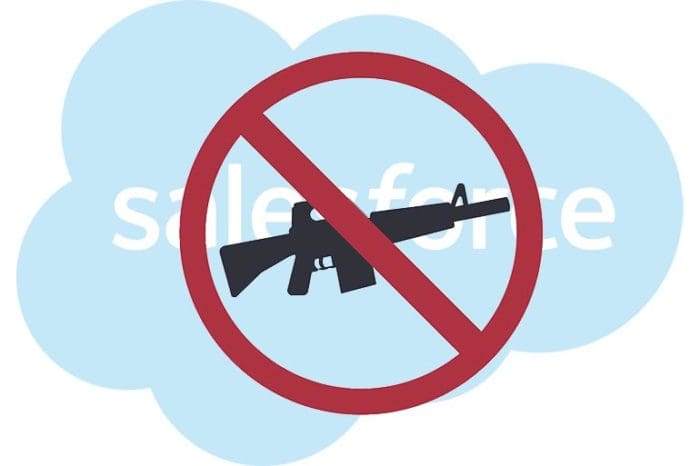Salesforce is a CRM (customer relationship management) software platform. It’s apparently well thought of and their e-commerce services are used by thousands of businesses including many retailers. One of Salesforce’s customers is Camping World. And Camping World sells guns.
Now, like so many other firms in the last year since Parkland, Salesforce is making it its business to tell their customers what lines of business are acceptable.
According to the Amazon Gazette Washington Post . . .
[B]ehind the scenes in recent weeks, the Silicon Valley tech giant has delivered a different message to gun-selling retailers such as Camping World: Stop selling military-style rifles, or stop using our software.
The pressure Salesforce is exerting on those retailers — barring them from using its technology to market products, manage customer service operations and fulfill orders — puts them in a difficult position. Camping World, for example, spends more than $1 million a year on Salesforce’s e-commerce software, according to one analyst estimate. Switching to another provider now could cost the company double that to migrate data, reconfigure systems and retrain employees.
Salesforce has a lot of company in the business world among firms that have decided to weigh in on what legal products their customers can and can’t manufacture and sell. Banks like Citigroup and Bank of America have announced with much fanfare that they won’t finance firms that produce America’s most popular rifles.
Tech companies like Shopify and Intuit, which owns Quickbooks, have terminated the services of their customers that sell guns, sometimes costing them tens of thousands of dollars in lost revenue and inconvenience.
As National Review’s David French put it . . .
Titans of American banking and communication are taking steps to restrict the use of their funds or platforms by gun makers, gun-rights advocates, and others. The threat is just now emerging, but it may be as great a danger to gun rights as it is to the culture of free speech in this nation, and indeed the two are linked.
Combine these moves with others like YouTube’s targeted demonetization, algorithm changes by Facebook and the politically-motivated shadow-banning of posters by Twitter and what you have is the gradual, but sure de-platforming of the gun industry by much of corporate America.
From the WP:
The change in Salesforce’s acceptable-use policy shows how a technology giant that is mostly unknown to the public is trying to influence what retailers in America sell and alter the dynamics of a charged social issue. While Salesforce is hardly a household name, it is a dominant provider of software and services that help businesses manage their customers. With roughly 40,000 employees and a market value of nearly $120 billion, it has become a behemoth in San Francisco. Its branded skyscraper also towers over the city as the tallest building and a major landmark.
These are moves made by CEOs who care more about getting good press coverage and back slaps by those in their social circle and obsequious media fluffers than maximizing shareholder value and ROI.
This tweet is from Salesforce’s CEO:
The AR-15 is the most popular rifle in America. Ban it. pic.twitter.com/WSueCvR2iJ
— Marc Benioff (@Benioff) February 15, 2018
When tech giants enter the broader debate, the consequences are magnified because of the critical services they provide behind the scenes to customers. Consumers often don’t realize they’re interacting with other companies when they place an item in their shopping cart or chat with a customer service representative. But Salesforce and other big tech companies wield significant influence because of that reliance on their software.
Some alternative processors and platforms (think Full30, Shooters Network, GearFire and AmmoReady, among others) that bill themselves as firearms-friendly have cropped up to try to fill the void left by the tech giants’ blackballing with limited and varying degrees of success so far.
Meanwhile, the other-ization of the firearms industry by much of corporate America continues apace. It’s slowly being forced into its own ghetto in order to survive. And while the process may have slowed, don’t look for it to stop any time soon.
